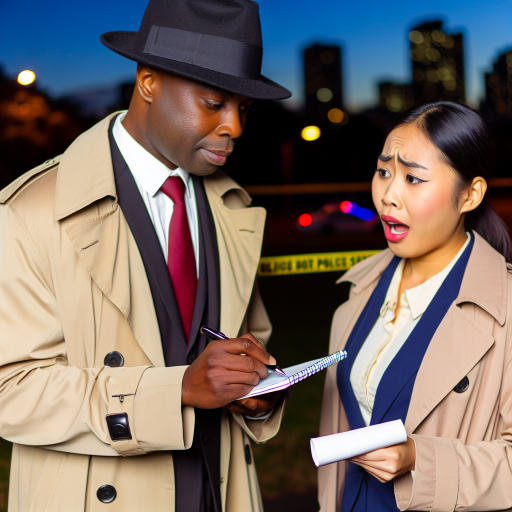Introduction:
In undercover operations, DEA agents play a crucial role in infiltrating drug trafficking networks.
These operations are essential in gathering intel and dismantling criminal organizations.
This blog post will delve into the methods and strategies utilized by DEA agents in effectively handling undercover operations.
Establishing a Cover Story:
DEA agents meticulously craft cover stories to seamlessly blend into the criminal environment without raising suspicion.
These cover stories are crucial in gaining the trust of targets and gathering valuable information.
Building Relationships:
DEA agents invest time in building relationships with individuals involved in drug trafficking to gain insights and evidence.
Developing trust is essential for successful undercover operations.
Surveillance and Reconnaissance:
Prior to infiltrating a drug trafficking network, DEA agents conduct surveillance and reconnaissance to gather intelligence on key players and locations.
This information is vital in planning and executing successful operations.
Risk Assessment and Mitigation:
DEA agents constantly assess the risks involved in undercover operations and implement mitigation strategies to ensure the safety of all parties involved.
Risk management is paramount in high-stakes undercover missions.
Use of Advanced Technology:
DEA agents leverage cutting-edge technology and surveillance equipment to gather evidence and monitor criminal activities.
Technology plays a crucial role in the success of undercover operations.
Collaboration with Law Enforcement Agencies:
DEA agents collaborate with local and federal law enforcement agencies to coordinate efforts in combating drug trafficking.
Teamwork and information-sharing are essential in achieving successful outcomes in undercover operations.
Training and preparation:
DEA agents undergo extensive training to prepare for undercover operations.
These training programs are designed to equip agents with the specialized skills needed to infiltrate criminal organizations.
Agents learn how to blend in seamlessly with the criminal elements they are investigating.
This requires a high level of physical fitness, as well as mental toughness to handle the dangers of undercover work.
Physical preparation is crucial for agents to maintain their cover and stay safe in dangerous situations.
Transform Your Career Today
Unlock a personalized career strategy that drives real results. Get tailored advice and a roadmap designed just for you.
Start NowThey often undergo rigorous physical training to ensure they can handle the challenges they may face during operations.
Mental preparation is equally important, as undercover work can be psychologically taxing.
Agents must be able to think on their feet and adapt to rapidly changing circumstances while maintaining their cover.
Overall, training and preparation are essential components of successful undercover operations for DEA agents.
By honing their skills and staying mentally and physically prepared, agents can effectively gather intelligence and make arrests in dangerous criminal environments.
- Rigorous training programs for DEA agents
- Specialized skills required for undercover work
- Importance of physical and mental preparation
Building Trust with Informants:
Establishing relationships with informants to gather information.
DEA agents understand the importance of building and maintaining relationships with informants.
By establishing trust and rapport with informants, agents are able to gather valuable intelligence on drug trafficking operations.
This information is crucial for planning and executing successful undercover operations.
Ensuring informant safety and confidentiality.
The safety and confidentiality of informants are top priorities for DEA agents.
Agents take necessary precautions to protect the identities of informants and ensure their safety during undercover operations.
This includes providing security measures and support to informants to minimize risks.
Utilizing informants in undercover operations.
Informants play a key role in undercover operations conducted by the DEA.
By leveraging the information provided by informants, agents are able to infiltrate drug trafficking networks and gather evidence to build strong cases against criminals.
Informants may assist agents in gathering evidence, conducting surveillance, or making controlled drug buys.
Find Out More: Correctional Officer Communication Skills
Developing cover identities:
Agents invest time in creating convincing backstories to gain access to criminal circles.
It is vital to remember every detail of the cover identity to avoid detection.
Transform Your Career Today
Unlock a personalized career strategy that drives real results. Get tailored advice and a roadmap designed just for you.
Start NowDEA agents must be flexible and able to switch between different personas seamlessly.
The cover story should align with the target’s expectations for credibility.
DEA agents undergo extensive training to embody their cover identities effectively.
Agents must be prepared to think on their feet and adapt to any situation.
Maintaining consistency in cover identities:
Agents must avoid slips that could jeopardize the entire operation.
Surveillance and monitoring are crucial to ensure consistency in interactions.
Regular updates and debriefings help agents stay on track with their cover stories.
DEA agents must be disciplined and vigilant to uphold the facade at all times.
Any deviation from the cover identity could raise suspicion and compromise the mission.
Practice and rehearsal play a significant role in maintaining a consistent cover identity.
Adapting to different roles and personas as needed:
Agents must be versatile and able to switch gears quickly in undercover work.
DEA operatives may need to play multiple roles within the same operation.
Flexibility is key in handling unexpected challenges that may require a different persona.
Adapting to new environments and scenarios is vital for successful undercover work.
Agents must be adept at blending in and adjusting their behavior to suit the situation.
Transitioning between personas demands a high level of emotional intelligence and adaptability.
Explore Further: Key Qualities of Effective School Resource Officers
Conducting Surveillance:
Surveillance is a critical aspect of undercover operations conducted by DEA agents.
It involves closely monitoring suspects and locations to gather evidence and intelligence without alerting the suspects.
Here’s a detailed look at how DEA agents handle surveillance during undercover operations:
Transform Your Career Today
Unlock a personalized career strategy that drives real results. Get tailored advice and a roadmap designed just for you.
Start NowMonitoring Suspects and Locations
DEA agents carefully observe the activities of suspects and keep track of their movements to gather information about their criminal activities.
This involves physically following suspects, as well as monitoring their communications and interactions with others.
By maintaining a discreet presence, DEA agents can gather valuable evidence without arousing suspicion.
Using Technology and Specialized Equipment
DEA agents leverage advanced technology and specialized equipment to enhance their surveillance capabilities.
This includes using GPS trackers, hidden cameras, and listening devices to track suspects and gather valuable intelligence.
By utilizing these tools, DEA agents can monitor suspects effectively and obtain crucial evidence to build a case against them.
Coordinating with a Team
Surveillance operations require effective coordination among DEA agents to gather accurate and timely intelligence.
Agents work together as a team to ensure that suspects are monitored constantly and that information is shared efficiently.
By coordinating their efforts, DEA agents can maximize their surveillance efforts and gather comprehensive evidence to support their investigations.
Discover More: Language Skills Beneficial for CBP Officers
Gathering evidence:
- Collecting evidence through controlled drug buys
- Ensuring chain of custody for evidence
- Documenting transactions and interactions for court purposes
DEA agents are tasked with gathering evidence to support their cases against drug traffickers and other criminals.
This process is crucial in building a solid case that can stand up in court.
One of the ways DEA agents gather evidence is through controlled drug buys.
This involves undercover agents posing as buyers to make purchases from suspects.
These transactions are carefully orchestrated and monitored to ensure evidence is collected legally.
Ensuring the chain of custody for evidence is another important aspect of gathering evidence.
This means that every step of the way, from collection to presentation in court, the evidence must be carefully documented and securely stored to prevent tampering or contamination.
DEA agents also document all transactions and interactions they have while undercover.
This documentation is essential for court purposes, as it provides a detailed account of all activities and conversations that took place during the operation.
Transform Your Career Today
Unlock a personalized career strategy that drives real results. Get tailored advice and a roadmap designed just for you.
Start NowThis information can be used as evidence to support charges against suspects.
Gathering evidence is a vital part of DEA undercover operations.
Through controlled drug buys, maintaining chain of custody, and documenting interactions, agents are able to build strong cases against criminals and help keep dangerous substances off the streets.
Discover More: How to Become a Federal Probation Officer

Handling dangerous situations:
- Dealing with high-risk situations in undercover operations
- Training on de-escalation techniques and self-defense
- Reporting incidents and seeking backup when necessary
DEA agents often find themselves in incredibly dangerous situations while conducting undercover operations.
These situations can range from meeting with known criminals to participating in drug deals or raids on cartel hideouts.
Dealing with high-risk situations in undercover operations
When faced with high-risk situations, DEA agents must rely on their training and experience to navigate these dangerous encounters.
They must be prepared to think on their feet and make split-second decisions that could mean the difference between life and death.
One of the key aspects of handling dangerous situations in undercover operations is the element of surprise.
DEA agents must often operate in a covert manner, maintaining their cover and blending in with their surroundings to gather crucial intelligence on criminal activities.
Training on de-escalation techniques and self-defense
DEA agents undergo rigorous training in de-escalation techniques and self-defense to prepare them for potentially violent confrontations.
They learn how to defuse tense situations and subdue suspects using non-lethal force when necessary.
In addition to de-escalation techniques, DEA agents are trained in self-defense tactics to protect themselves in dangerous situations.
This training includes hand-to-hand combat, weapon retention, and situational awareness to ensure agents can defend themselves if the need arises.
Reporting incidents and seeking backup when necessary
When faced with a dangerous situation, DEA agents are trained to prioritize their safety and the safety of others.
They are instructed to report incidents immediately to their superiors and request backup if the situation escalates beyond their control.
Seeking backup is a crucial aspect of handling dangerous situations in undercover operations.
DEA agents rely on their team members for support and assistance in challenging or life-threatening situations.
By working together, agents can increase their chances of successfully completing their mission and safely returning home.
Transform Your Career Today
Unlock a personalized career strategy that drives real results. Get tailored advice and a roadmap designed just for you.
Start NowConducting Surveillance
Agents spend hours observing and gathering intelligence on suspects and their activities.
Building Trust with Informants
Developing relationships with informants is crucial to gaining insider information on criminal organizations.
Infiltrating Criminal Networks
Agents must blend in with criminals to gain access to illegal activities and gather evidence.
Handling Evidence
Agents are responsible for securing and maintaining the chain of custody of all evidence collected.
Managing Risk
Undercover work involves significant risks, and agents must constantly assess and mitigate potential dangers.
Conducting Controlled Buys
Agents may need to purchase illegal substances or weapons to gather evidence against suspects.
When it comes to testifying in court, DEA agents play a crucial role in the legal process.
Providing Testimony as a Witness
Agents are often called upon to testify about their observations and interactions during undercover operations.
Presenting Evidence Gathered
Agents must present the evidence they collected in a clear and compelling manner to support prosecution.
Ensuring Integrity of the Investigation
Agents must ensure that all procedures and protocols were followed to maintain the integrity of the investigation.
Testifying in court can be a nerve-wracking experience for DEA agents, but it is a critical part of their job.
Overall, DEA agents must be highly skilled, adaptable, and dedicated to successfully handle undercover operations and legal proceedings.
Dealing with the Psychological Toll of Undercover Work
Undercover work can take a significant toll on DEA agents.
They are constantly exposed to high-stress situations and potential danger.
The need to maintain a false identity can be emotionally taxing.
Gathering critical information and building trust with criminals adds to this burden.
Agents may experience feelings of anxiety, fear, and isolation.
The pressure to perform and maintain cover increases the psychological burden.
Seeking Therapy and Support to Cope with Stress and Trauma
Recognizing the challenges of undercover work is important.
DEA agents are encouraged to seek therapy and support for stress and trauma.
Transform Your Career Today
Unlock a personalized career strategy that drives real results. Get tailored advice and a roadmap designed just for you.
Start NowTherapy helps agents process their experiences and manage emotions.
They can develop coping strategies through these sessions.
DEA provides access to mental health resources for agents needing assistance.
This support addresses emotional challenges and prevents long-term issues.
Importance of Self-Care and Mental Well-Being for DEA Agents
Self-care is crucial for DEA agents involved in undercover operations.
This practice allows them to recharge, refocus, and manage stress effectively.
Taking care of their mental well-being ensures efficiency on the job.
Engaging in relaxation activities promotes better mental health.
Activities like exercise, meditation, or hobbies can relieve stress.
Prioritizing self-care helps agents reduce burnout and process experiences.
It also assists in preventing mental health issues.
Strategies Used by DEA Agents
DEA agents employ various methods in their undercover operations.
They immerse themselves in dangerous environments to build trust with criminals.
This process helps agents gather valuable intelligence to dismantle drug trafficking networks.
It is crucial to emphasize the dedication made by these agents in combating drug trafficking.
They put their lives on the line to protect communities from the harmful effects of drugs.
Their commitment to this mission is unwavering, displaying immense bravery.
Undercover operations play a significant role in law enforcement.
These operations target high-level drug traffickers and disrupt criminal activities.
Without these efforts, many dangerous individuals would continue to operate with impunity.
Transform Your Career Today
Unlock a personalized career strategy that drives real results. Get tailored advice and a roadmap designed just for you.
Start NowSuch activities cause immense harm to society at large.
The importance of undercover operations cannot be overstated.
DEA agents work tirelessly to gather evidence and make arrests.
They also focus on preventing the flow of illegal drugs into our neighborhoods.
Their efforts are crucial in safeguarding our communities.
This dedication ensures the upholding of the rule of law across all areas.
Additional Resources
Police and Detectives : Occupational Outlook Handbook: : U.S. …




